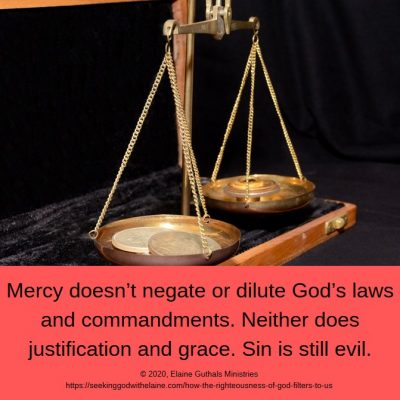If God is righteous, how do we become righteous? That process involves a lot of churchy words. This devotion tries to tie all those words together.
Nuggets
- When we look at the list of what the righteousness of God is, it bleeds into His righteousness filtering down to us.
- If righteousness is a gift, it is received through faith.
- Jesus justifies us when we put our lives in His hand.
- God did not have to extend grace to us.
- To redeem us — to pay the price for our sins — Jesus has to suffer.
Devotions in the God’s Righteousness series
How the Righteousness of God Filters to Us

Procedural note: When we’ve talked about something before, I’ve been putting a summary of what we’ve already learned in the current devotion. This is 1) to catch new readers up and 2) to review nuggets that will be used in the current devotion to attach new content. That is how we learn.
I am going to start putting some of that in a glossary. That will save words for you in the current devotion and time for me since I just have to keep the page updated after it is created. I’ll put a button so you can access it. (I may not get all of the glossaries added on this devotion until tomorrow. Sorry.)
Okay, so I said that I wanted to do a roundup where we put everything into perspective. This is going to be a start of that.
This is a Sunday School lesson I won’t get to teach. Instead, I am going to get two devotions out of it.
We’ve been talking a lot of churchy words lately. I wanted to make sure we tied them all together. Let’s see if Romans 3 can get us started in that direction.
Let's Put It into Context
“But now, apart from the law, the righteousness of God has been revealed, attested by the Law and the Prophets” (Rom. 3: 21 CSB)
One thing we haven’t focused on is everything starts off with God’s righteousness. The Holman Bible Dictionary states that the Hebrews struggled with the concept as much as we do. It states that “God’s righteousness was not a metaphysical property but that dimension of the divine experienced by those within the covenantal community.”
Basically, what that says is they based what God’s righteousness was off their interaction with Him. Did God fulfill His part of the covenant like He said He would?
But the Hebrews also saw God as Judge. Now, this is talking about Jesus here. “and he will delight in the fear of the Lord. He will not judge by what he sees with his eyes, or decide by what he hears with his ears; but with righteousness he will judge the needy, with justice he will give decisions for the poor of the earth.
He will strike the earth with the rod of his mouth; with the breath of his lips he will slay the wicked” (Isa. 11: 3-4 NIV). God is Judge because He was Creator.
Luckily for us, God wants back the relationship that was lost when the original sin occurred. That is why He designed the plan of salvation.
If you have not admitted that your relationship is not right with God,
have not asked Jesus to be your Lord and Savior,
and have not confessed your sins,
please read through the Plan of Salvation and prayerfully consider what God is asking you to do.
When we look at the list of what the righteousness of God is, it bleeds into His righteousness filtering down to us.
- An attribute of God
- Given as a gift by God to those who are redeemed by faith in Jesus.
- Given freely to all who confess Him as Sovereign Lord.
- Not earned through things we do.
- Eliminates human unrighteousness.
- Evident to all.
- Validated by the law and prophets.
Faith
“The righteousness of God is through faith in Jesus Christ to all who believe, since there is no distinction. For all have sinned and fall short of the glory of God” (Rom. 3: 22-23 CSB)
If righteousness is a gift, it is received through faith. Faith is the belief that the doctrines stated in God’s Word are true, even if we do not understand all aspects of them.
It is more than a belief. Adeney called it an active trust. “If you keep my commandments, you will abide in my love, just as I have kept my Father’s commandments and abide in his love” (Jn. 15: 10 ESV).
Because all mankind has sinned (Rom. 3: 23), we needed a plan to restore our relationships with God. Jesus accomplished that plan when He died on the cross. His blood paid the price for our sins.
Haldane made a good point. He wrote, “The righteousness of Adam or of angels could only be available while it continued to be performed. The moment, therefore, in which they transgressed, the advantages derived from all their previous obedience ceased.”
We don’t have righteousness without faith in Jesus. “A period of seventy sets of seven has been decreed for your people and your holy city to finish their rebellion, to put an end to their sin, to atone for their guilt, to bring in everlasting righteousness, to confirm the prophetic vision, and to anoint the Most Holy Place” (Dan. 9: 24 NLT emphasis added).
Adam and Eve said, “We don’t have to listen to God. We want to do our own thing.”
Then they lost the righteousness they had when they were created. Man can’t be righteous on our own.
There is only one way to attain righteousness: “… through faith in Jesus Christ …” (Rom. 3: 22 CSB).
I think we need to hear what Adeney had to say — especially in this changed world. He wrote, “With inspired insight Paul surveyed the condition of mankind, and put his finger at once on its great root evil. This was not poverty, pain, death, but moral corruption. He saw that that was the greatest gospel which could lift men out of the mire of wickedness and set their feet on the rock of righteousness.”
There is hope for us. We just have to follow God’s plan os salvation.
We have to be cautious, though. We can’t start thinking that our faith is our righteousness. We don’t want to make our faith a work.
True, Matthew 25: 31-46 says there has to be evidence of faith. We have to be careful and not think those acts justify us. Belief gets us salvation. Faith produces works that are the result of our obedience. In turn, those works show our faith to others.
But what is this justification?
Justification
“They are justified freely …” (Rom. 3: 24 CSB)
Jesus justifies us when we put our lives in His hand. Justification means the act of making something righteous before God through forgiveness. We needed this forgiveness because all of us have sinned (Rom. 3: 23). It constitutes a change in our character that is achieved through sanctification.
The first nugget is justification is free. “For the wages of sin is death, but the free gift of God is eternal life through Christ Jesus our Lord” (Rom. 6: 23 NLT). It is the gift of grace.
We don’t have to pay for it by cleaning up our acts. We don’t earn it by doing the do’s and not doing the don’ts.
Boston told us the steps of justification.
God judges us according to the laws and commandments that He has given.
Sins are pardoned when we submit to God.
We accept the gift by submitting to Him. We repent of our sins and obey His laws and commandments.
Glossary: Repentance
Glossary: Sin
Glossary: Forgiveness
Glossary: Obedience
Sometimes, we might get a little squirrelly about this being a one-shot gift. Jesus paid the price once — and that was enough to justify us. “For by that one offering he forever made perfect those who are being made holy” (Heb.
We accept and receive His righteousness.
Yes, we still continue to sin after conversion, but we don’t need for Him to come and die again. Instead, we need God’s grace daily.

Grace
“… justified freely by his grace …” (Rom. 3: 24 CSB)
Grace is the second nugget. Grace is a free and unmerited gift from Heavenly Father given through His Son, Jesus Christ that enables salvation and spiritual healing to believers. Because of God’s infinite grace, He devised the plan of salvation that made Jesus our Redeemer in order to forgive us of our sins.
One thing we have to get loud and clear is God did not have to extend grace to us. We are not entitled to it. Mankind disobeyed God. He doesn’t have to turn a blind eye to that fact.
Extend it, God does. He sends the Holy Spirit to prompt us. McGillivray wrote that the only way we can receive this righteousness is through revelation by God.
What? You don’t think the Holy Spirit skipped you? Have you every felt that this world was broken? Did you ever think you couldn’t do anything to fix it?
It is. You can’t.
But where did you go after that? Did you go look for what some scientist (or worse, some celebrity) said was the fix?
Or did you look to the Creator for what you needed to do?
Were you so seeped in the world that you didn’t recognize that was the Holy Spirit prompting you?
We talked in the last devotion that mercy doesn’t negate or dilute God’s laws and commandments. Neither does justification and grace. Sin is still evil.

Redemption
“They are justified freely by his grace through the redemption that is in Christ Jesus” (Rom. 3: 24 CSB)
Yes, Jesus was 100% man, but there is a huge reason why He was able to fill the role of Redeemer. He is also 100% God.
To redeem us — to pay the price for our sins — Jesus has to suffer. Greatly.
That was why Jesus was born on this earth. “‘You are a king, then!’ said Pilate. Jesus answered, ‘You say that I am a king. In fact, the reason I was born and came into the world is to testify to the truth. Everyone on the side of truth listens to me’” (Jn.18: 37 NLT).
I know. Why would Jesus’ blood pay the price for our sins?
Well, because that is what God would accept. Jesus was the Perfect sacrifice. “So Christ, having been offered once to bear the sins of many, will appear a second time, not to deal with sin but to save those who are eagerly waiting for him” (Heb. 9: 28 ESV).
But let’s look at it this way. We were slaves to sin. “Jesus answered them, ‘Truly, truly, I say to you, everyone who commits sin is a slave to sin’” (Jn. 8: 34 ESV).
Enter Jesus as our Redeemer. “For freedom Christ has set us free; stand firm therefore, and do not submit again to a yoke of slavery” (Gal. 5: 1 ESV).
That is really telling when we consider Jesus was the substitute for us. How much was Judas paid to betray Jesus. Thirty pieces of silver — the price of a slave.
We were the slaves. Jesus made Himself a slave when He took our place and took our sins on Him.
In the next devotion, we will look at propitiation and atonement.
Father. At times, we look at all You are asking us to do and wonder how we can be obedient to You. We only can with Your help. Help us grow in understanding of how You want us to live. Amen.
What do you think?
Leave me a comment below (about this or anything else) or head over to my Facebook group for some interactive discussion.
If you don’t understand something and would like further clarification, please contact me.
If you have not signed up for the email daily or weekly providing the link to the devotions and the newsletter, do so below.
If God has used this devotion to speak with you, consider sharing it on social media.
Pingback: Did Jesus or His Blood Redeem Us? – Seeking God with Elaine
Pingback: God’s Judgment of Sin – Seeking God with Elaine